In Mediation, Generally a Quantity Is not a Quantity
In many settlement negotiations, the two sides limit their differences of opinion to a small gap in their positions, a gap so small that it pales in comparison to the total amount of money being discussed. This often happens in divorce mediation, where clients threaten to blow up a multi-million dollar divorce settlement in the past $ 5,000. Why would anyone do this? Why should each side fall apart everything over an amount they are obviously spending on lawyers if they keep fighting?
The reason is that it is rarely about the money and often it is about what the money represents. Those last few dollars in a negotiation often mean winning or losing. They represent the potential for confirmation or just further rejection. They represent all of the giving that has brought us here so far and the loss that comes with it; and in the event of a divorce, those last few dollars may represent the true end of the relationship and the last chance to hold onto it.
Our friend and fellow mediator, David Kellem, wrote an excellent article, titled “The Price of Peace,” describing how he asked a client who is holding onto the last $ 15,000 of a lengthy and painful negotiation that both parties are already new Relationship began: “How would it feel to you going to Diane’s house this afternoon and instead of telling her how awful your wife is, you could tell her the case is cleared and life is moving forward.” can?
David broke the cycle by helping his client realize that regardless of the final number (within reason), the value of peace and a final divorce was something to be weighed on his own terms. This is a value only customers can choose and which is often overlooked because it has no legal or financial value. Only a client can decide whether the price of peace is more important to them than the cost of struggle.
Often times, the number customers disagree on won’t make or break either of them. The remaining disagreement is often based more on a sense of “right”; about where they are from and what that number could mean for each of them. Rather than focusing on those feelings of loss, I encourage clients to think about this number as much as possible, rather than just a number that will allow them to resolve their conflict. I ask them to realize that no matter where they land, none of them will get well. Unfortunately, in a divorce, no one leaves it, but it is possible to leave once you have found enough peace to move on and begin the healing.


Comments are closed.